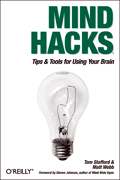- why does your mind play tricks on you?
- why can you read the same sentence with the missing word about 5 times but not see it?
- why do visualization and "mind games" work?
- do we really use only 10% of our brains?
- why hearing someone talking on a cell phone is more annoying than hearing two people talking near you in exactly the same environment?
Well, you can stop wondering. I've just finished "Mind Hacks" by Tom Stafford and Matt Webb, and the answers to these and about a Brazillian other things are addressed within. This is a really fun book, and I bought it on impulse while I was on Amazon the other day subscribing to Make, and read it on a long flight today.
There are 100 "Hacks" in the book, each of which explains a different aspect of the things your brain does to make the world seem smooth and familiar to you. For example, Hack #62 explains the Broken Escalator Phenomon:
"One such phenomenon can be felt when you walk onto a broken escalator. You know it's broken, but your brain's autopilot takes over regardless, inappropriately adjusting your posture and gait as if the escalator were moving. This has been dubbed the broken escalator phenomenon."
I liked this one because I had a similar "my body is not my own" experience when I was walking on a broken "moving sidewalk" in the Las Vegas airport last week. I knew the thing was broken, but I still felt my body trying to adjust for a non-existent change in speed as I stepped on and off of the moving sidewalk.
For each Hack, the book goes on to explain how the Hack works, why it works and, in many cases, provides a fun "Hack the Hack" exercise you can try to test it out. There are a lot of references to cool things on the web like one on how to build your own "Motor/Sensory Homounculus." Yeah...that one is explained in the book, too.
Cool stuff, and lots of fun. Get it for yourself or as a gift for that special someone.
Update: Here's another sample (no pun intended) to whet your appetite. Here's Hack #48:
"A sample of Bing Crosby's "White Christmas" has been hidden in the sound file on our book web site [link]. The sound file is 30 seconds long and is mostly noise, so you will have to listen carefully to detect when the song starts. The song will start either in the first, second, or third 10 seconds and will be very faint, so pay close attention."
To find out about the results, pick up the book and read Hack #48: Detect Sounds on the Margins of Certainty

